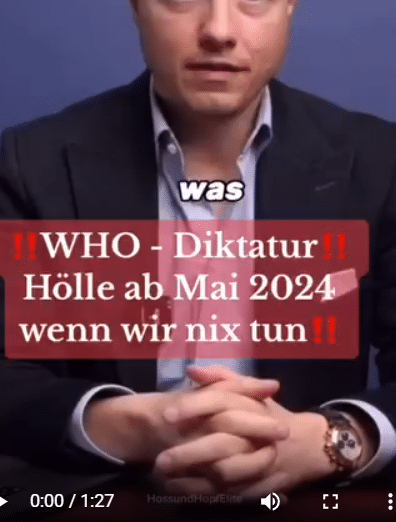The claim
A video circulating online claims that the WHO's international pandemic treaty leads to totalitarian control and undermines the sovereignty of states.
Our conclusion
These representations are false. The Pandemic Treaty strengthens preparedness for pandemics without compromising the sovereignty of states.
The World Health Organization (WHO) often finds itself at the center of controversy and criticism, especially during times of global health crises. A recent video shared suggests that the WHO-initiated international pandemic treaty poses a threat to national sovereignty by giving the organization broad power over member states.

What are we talking about?
At the heart of the debate is a video that warns against an alleged takeover of state sovereignty by the WHO. It claims that the pandemic treaty allows the WHO to impose compulsory vaccinations and curfews, which would mean direct interference in the internal affairs of states. These allegations have led to significant alarm and the spread of misinformation.
Our assessment of the pandemic contract
A detailed analysis of the available facts shows that the criticized aspects of the pandemic treaty are based on misunderstandings or misinformation. The purpose of this treaty is to ensure better international cooperation and coordination in the event of future pandemics. It is not an instrument to restrict national sovereignty.
Facts about the pandemic contract
The Pandemic Treaty , still in development, aims to strengthen global health security by providing states with binding guidelines for preparing for and responding to pandemics. According to experts and official statements, the WHO has no authority to impose sanctions or enforce direct measures such as lockdowns in member countries. The decision to ratify and implement the treaty lies with the individual states, with the respective national legislation being decisive.
In addition, the draft pandemic treaty emphasizes the sovereignty of member states and their right to act in accordance with their national legislation. Criticism of the treaty relates more to practical aspects such as potential bureaucratic hurdles and the effectiveness of certain measures, but not to an alleged undermining of state sovereignty.
Questions and answers about the pandemic contract:
Question 1: Can the WHO enforce lockdowns or vaccinations with the pandemic treaty?
Answer 1: No, WHO has no such authority. The treaty aims at better preparation and coordination, not control over national measures.
Question 2: Does the pandemic treaty undermine the sovereignty of states?
Answer 2: No, the treaty respects the sovereignty of states and their right to act in accordance with national legislation.
Question 3: Are the concerns mentioned in the video about a “WHO dictatorship” justified?
Answer 3: No, these concerns are based on misunderstandings and are not supported by facts.
Question 4: Why is the pandemic treaty criticized?
Answer 4: The criticism mainly relates to bureaucratic aspects and practical implementation, not to a threat to sovereignty.
Question 5: What happens if a country does not comply with the requirements of the treaty?
Answer 5: The WHO cannot impose sanctions, but can only make recommendations and urge compliance.
Conclusion on the pandemic contract
The idea that the pandemic treaty leads to a takeover of state sovereignty by the WHO has no basis. The treaty is an attempt to strengthen international cooperation in the health sector and to better prepare states for pandemics. The sovereignty of the states remains unaffected, and participation and the implementation of the contractual contents take place on a voluntary basis, in accordance with national legislation.
Note: The channel “Hoss und Hopf”, which was known for spreading the controversial video about the WHO pandemic treaty, was banned from the TikTok platform on February 14th. We HERE .
The reason for this measure was the spread of dangerous misinformation and conspiracy theories. Not only the original video, but also copies on other channels fell victim to the deletion wave because they spread similarly misleading content. This action underlines the efforts of social media platforms to combat the spread of disinformation and to place public discussion on an informed and truthful basis.
Mimikama tip
Stay informed and critical of misinformation. Subscribe to our newsletter for reliable information and sign up for our online lectures and workshops to learn more about combating disinformation: Mimikama Newsletter and Mimikama Online Lectures .
Source: dpa fact checking
Also read:
Notes:
1) This content reflects the current state of affairs at the time of publication. The reproduction of individual images, screenshots, embeds or video sequences serves to discuss the topic. 2) Individual contributions were created through the use of machine assistance and were carefully checked by the Mimikama editorial team before publication. ( Reason )

